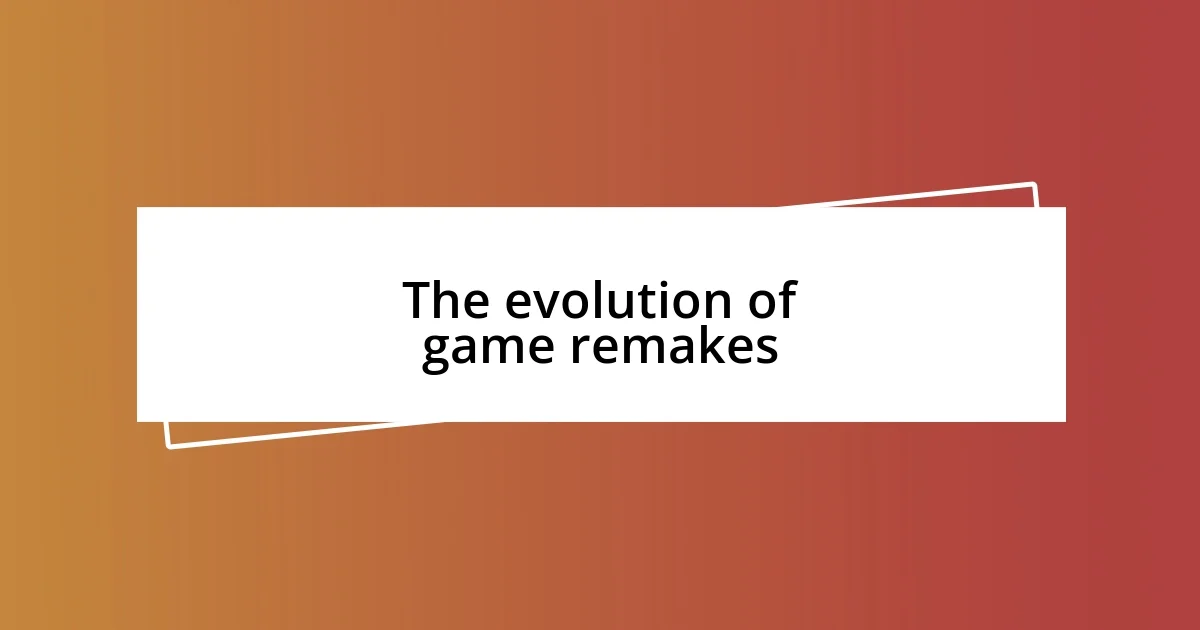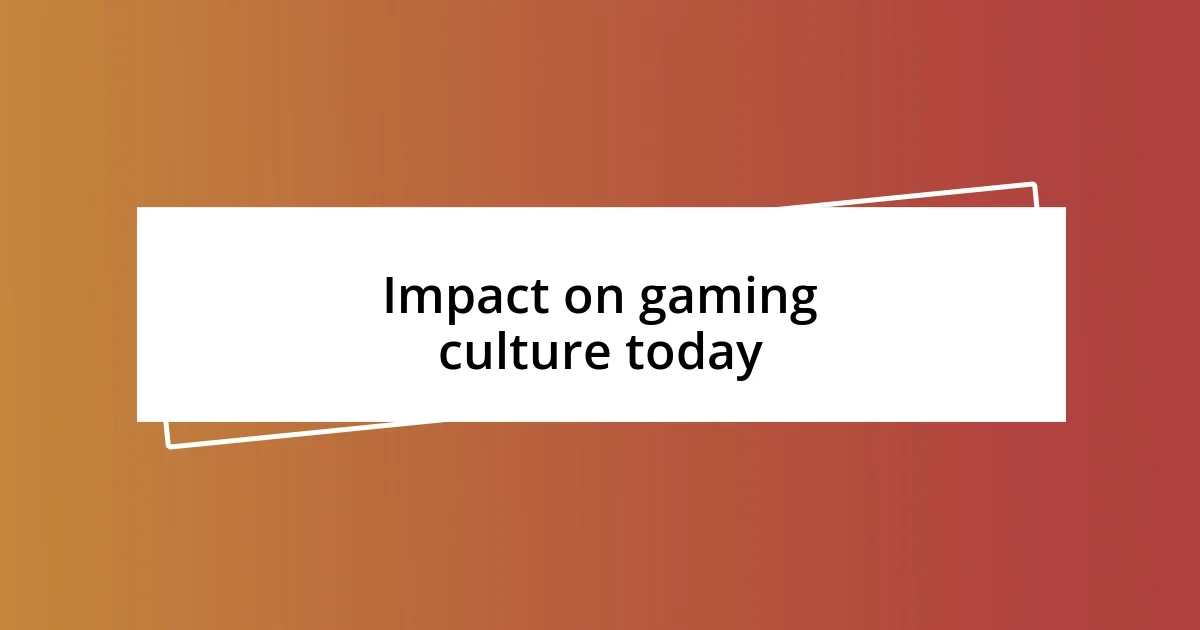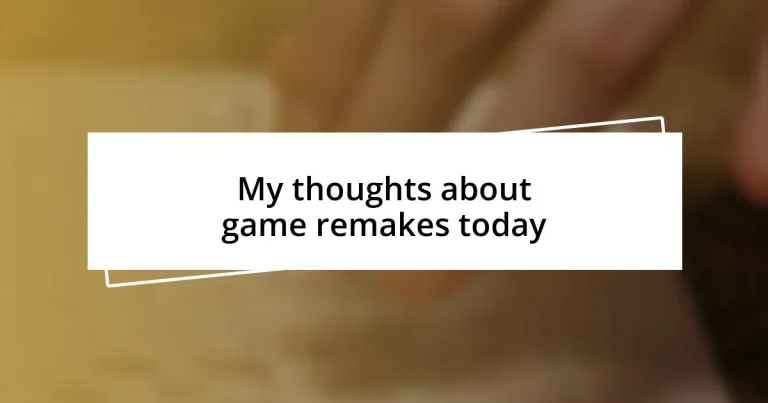Key takeaways:
- Game remakes balance nostalgia with modern innovation, preserving original charm while enhancing graphics and gameplay.
- Advancements in technology and community engagement significantly contribute to the popularity and cultural impact of game remakes.
- Future trends may include hyper-realistic graphics, cultural updates, and fan-driven remakes that foster deeper community connections.

The evolution of game remakes
Game remakes have come a long way, evolving from simple 8-bit graphics improvements to fully immersive worlds that often rival original experiences. I still remember when I played the remake of “Final Fantasy VII.” The depth and detail made me feel as though I was stepping back into my childhood, but with a fresh, modern twist. Isn’t it fascinating how nostalgia can be both comforting and invigorating?
The technology behind these remakes has advanced drastically, allowing developers to not only enhance visuals but also revisit and even refine gameplay mechanics. For instance, the “Resident Evil” remakes have not only updated graphics but also reimagined controls, leading to a more engaging experience. Have you ever felt that a remake managed to surpass your expectations? That sense of wonder is something special.
In recent years, there’s been a shift in focus toward preserving the essence of what made the original games iconic while also making them relevant for today’s gamers. I find it compelling when a studio honors the past while also being bold enough to innovate. This dance between nostalgia and innovation often leads to discussions among fans—what should stay the same, and what should change? What do you think?

Reasons for game remakes popularity
Game remakes have skyrocketed in popularity due to their ability to cater to both veteran gamers and newcomers. Personally, when I heard about the remake of “The Legend of Zelda: Link’s Awakening,” I felt a rush of excitement. I fondly remembered the original and was curious to see how they would modernize it while keeping that magical essence intact. This blend of nostalgia with new experiences creates a bridge between generations of players, making remakes universally appealing.
Moreover, the advancements in technology play a significant role in the remake phenomenon. I recall being blown away by the graphics and fluid gameplay of modern remakes compared to what I experienced in my childhood. With developers now able to utilize high-definition visuals, improved sound design, and engaging storylines, the gaming experience feels richer than ever. It’s as if these remakes are love letters to the originals, giving both heartfelt homage and fresh perspectives.
Finally, there’s a growing trend toward community engagement. Fans often voice their wishes for remakes, making them feel involved in the development process. When I see game studios actively listen to fan feedback—like when they remade “Demon’s Souls” to address player desires—it gives me hope for the future of gaming. This connection between developers and gamers creates an exciting dialogue, making remakes a shared journey rather than just a product launch.
| Reason | Details |
|---|---|
| Nostalgia | Remakes evoke fond memories while introducing modern gameplay. |
| Technology | Improvements in graphics and mechanics create richer experiences. |
| Community Engagement | Fans influence remakes through feedback, fostering connection. |

Impact on gaming culture today
The impact of game remakes on today’s gaming culture is significant. I’ve witnessed how they reignite conversations about classic titles, rejuvenating interest in franchises that may have been dormant for years. It’s as if these remakes breathe new life into beloved characters and stories, drawing in both seasoned players and a new audience who may have never experienced the originals. I cannot help but feel a sense of camaraderie when I share my favorite moments from these reimagined games with others on forums or social media; it’s like we’re all reliving a cherished memory together.
- They create a sense of community, as discussions about remakes often spark debates on the preservation of gaming history.
- Remakes serve as a reminder of how far the industry has evolved, encouraging deeper appreciation for game design.
- By integrating modern sensibilities, they challenge long-held beliefs about what a game should be, thus influencing future developments.
I often find myself reminiscing about the excitement I felt when playing remakes like “Shadow of the Colossus.” That thrill of not only reliving my past but also discovering new layers to the game made me rethink how these experiences shape our understanding of interactive storytelling. Overall, remakes aren’t just about nostalgia; they actively shape our culture and connect generations of gamers.

Pros and cons of game remakes
There are compelling pros and cons when it comes to game remakes, and I’ve experienced both sides firsthand. On the positive end, remakes allow developers to enhance beloved titles, making them accessible for a new generation. I still remember the thrill I felt revisiting “Resident Evil 2” with its stunning graphics and revamped mechanics; it felt like a fresh adventure while honoring everything I loved about the original. Isn’t it great when that nostalgic charm is not only preserved but also polished?
However, not all remakes hit the mark. Sometimes, the changes can feel disconnecting or miss the essence of what made the original special. I was disappointed with a recent remake that altered fundamental gameplay elements, making it feel like a different game altogether. Has anyone else felt that flicker of frustration when a remake doesn’t deliver the magic we hoped for?
Ultimately, the balance between preserving nostalgia and embracing innovation is delicate. While some gamers crave the comfort of familiar mechanics and visuals, others yearn for entirely new experiences. I often ponder: can a remake truly capture the spirit of its predecessor, or will the attempt to innovate overshadow its roots? Each remake sparks this debate, revealing our diverse preferences as gamers and reminding us that while technology evolves, our emotional connections to games remain timeless.

Notable examples of recent remakes
One standout example in the realm of recent remakes is “Final Fantasy VII Remake.” My experience diving back into the vibrant world of Midgar, with its breathtaking graphics and reimagined character arcs, was nothing short of enchanting. It reminded me of the first time I encountered the game on the original PlayStation, but this time it felt fresh and expansive—like stepping into a beloved memory that had suddenly come to life anew. Have you ever felt that surge of excitement when you witness a familiar world being transformed so beautifully?
Another notable remake is “The Legend of Zelda: Link’s Awakening.” I vividly recall being skeptical at first about how they could capture the charm of the original Game Boy title. Yet, the delightful art style and whimsical approach truly won me over. Playing it felt like rediscovering an old storybook from my childhood, bringing forth nostalgia while inviting me to explore once again. It raises a question, doesn’t it? How do we balance nostalgia with modern gaming expectations?
Lastly, “Demon’s Souls” is an impressive entry that deserves a mention. Personally, I found the suspense and challenge even more captivating thanks to the updated visuals and performance improvements. Returning to the treacherous land of Boletaria felt like facing an old foe with renewed courage. It’s fascinating how remakes can amplify the emotional stakes in a game, merging fear with excitement in a way that feels incredibly modern yet timeless. Isn’t it amazing how a remake can redefine our experiences and emotions tied to a game we thought we knew so well?

What makes a good remake
Creating a good remake is all about striking the right balance between innovation and nostalgia. From my perspective, a successful remake preserves the core elements that made the original special, while also updating graphics and mechanics to meet contemporary standards. I recall my excitement when I heard a favorite childhood game was being remade; I felt a mix of hope and concern about whether it could live up to my cherished memories.
Additionally, I believe that a strong narrative is crucial in a remake. When developers deepen character arcs or introduce new story elements, it can breathe fresh life into a familiar tale. For instance, when I played a remake that added backstory to secondary characters, it transformed my understanding of the entire plot. Isn’t it remarkable how a little added depth can make you see a story in a whole new light?
Lastly, accessibility plays a significant role in the success of a remake. I appreciate when games not only enhance graphics but also improve usability, making them enjoyable for both new players and veterans. There’s something satisfying about revisiting a classic and finding it comfortably aligns with modern gaming capabilities. Have you ever experienced the joy of revisiting a game and feeling like you could dive right in, without the frustration of outdated mechanics? It transforms your gameplay experience entirely.

Future trends in game remakes
As I look ahead, I see a trend towards hyper-realistic graphics and immersive gameplay in game remakes. With advancements in technology, there’s a palpable excitement in experiencing beloved worlds with level of detail that I could only dream of in the past. Imagine reliving a classic adventure, but this time feeling the weather changes in real-time or hearing the rustle of leaves with such clarity that it transports you right back to your childhood. Doesn’t the thought of this kind of sensory experience make you want to jump back into those worlds immediately?
Moreover, I believe we’ll see more developers embracing the concept of “cultural updates.” As society evolves, so do our values and perspectives. It’s fascinating to think that some remakes might not just pay homage to the original, but also infuse contemporary themes and diverse representation into their narratives. I remember playing a game that updated its portrayal of female characters, and it made me reflect on the importance of seeing relatable heroes and stories. Isn’t it exciting to consider how future remakes may tackle relevant social issues, opening up discussions within the gaming community?
Finally, I suspect that we will increasingly witness fan-driven remakes and community projects gaining momentum. With the rise of platforms that support game development, I find it thrilling to think about fans banding together to recreate their favorite classics. I once joined a crowdfunding campaign for an indie studio working on a remake; the excitement in that community felt electric. How incredible would it be to see a remake shaped by those who loved the original most? It brings a whole new level of passion and authenticity to the table, don’t you think?














